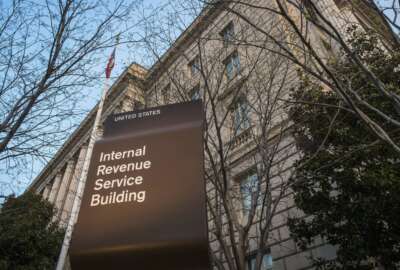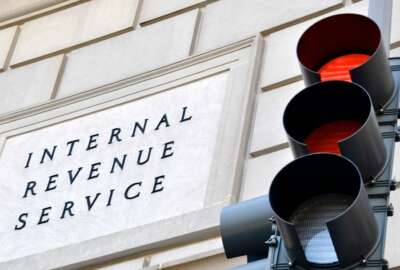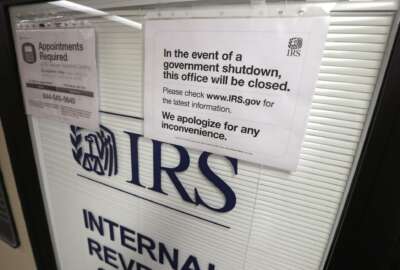IRS gets $1B funding increase in draft FY 2023 bill from House appropriators
Committee Chairwoman Rosa DeLauro (D-Conn.) said the IRS budget outlined in the draft bill would help the agency "provide better customer service and crack down on...
The House Appropriations Committee is calling for giving the IRS a billion-dollar increase to its topline budget for fiscal 2023.
The committee’s draft financial services and general government spending bill, released Wednesday, demonstrates a willingness from some lawmakers to gradually restore the IRS’ budget through annual appropriations.
The IRS in this proposal would get a $13.6 billion topline budget, and would see the biggest spending increase in its enforcement and taxpayer service operations.
The draft spending plan comes after Congress, in its fiscal 2022 omnibus spending deal, gave the IRS its largest spending increase in decades. The 2022 omnibus deal gave $12.6 billion to the IRS, the largest budget increase the agency has received since 2001.
Committee Chairwoman Rosa DeLauro (D-Conn.) said the IRS budget outlined in the draft bill would help the agency “provide better customer service and crack down on big corporations and the wealthy who are not paying their fair share in taxes.”
The 2022 spending bill also gave the IRS long-sought-after direct hiring authority, which allowed the agency to bring employees onboard more quickly to deal with its current backlog of tax returns and correspondence.
IRS Commissioner has repeatedly told lawmakers for the direct hiring authority has been essential to the agency’s plans to bring 10,000 IRS employees onboard, half this year and half next year.

“Congress rescued us. There’s no other way for me to say that with direct hiring authority,” Commissioner Chuck Rettig told the Senate Appropriations financial services and general government subcommittee on May 4.
Much of the funding increase would go toward the IRS’s enforcement budget. The bill sets $6.1 billion for IRS enforcement, which is a $682 million increase from enacted levels.
The bill would also give the IRS a $3.4 billion budget for taxpayer services, or an increase of $630 million above enacted levels. That includes funding for the National Taxpayer Advocate and increased personnel to improve IRS customer service.
The IRS would receive a $310 million budget for Business Systems Modernization, a fund that’s focused on modernizing IRS legacy systems and improving IRS Web applications and tax filing processing, or a $35 million increase from current levels. The funding would be available until Sept. 30, 2025.
The IRS would also receive $3.8 billion for operations support.
The draft bill directs the IRS to maintain an employee training program, focused on “taxpayers’ rights, dealing courteously with taxpayers, cross-cultural relations, ethics, and the impartial application of tax law.”
The bill states that the IRS shall institute and enforce policies and procedures that will safeguard the confidentiality of taxpayer information and protect taxpayers against identity theft.
A recent Government Accountability Office report found that the IRS completed nearly 1,700 investigations of alleged willful unauthorized access of tax data by employees between fiscal 2012 and 2021. Of those investigations, the IRS determined that in 462 cases (27%) the employee in question violated the agency’s policy on unauthorized access to taxpayer records.
The draft bill also directs the IRS to increase staffing and improve facilities to handle a greater volume of calls from taxpayers. The bill directs the IRS commissioner shall continue its level of phone service and “enhance the response time to taxpayer communications.”
The Treasury Inspector General for Tax Administration would receive a more than $179 million budget for fiscal 2023.
The draft bill signals a wiliness to give the IRS incremental funding increases, rather than the administration’s original plan to give the IRS as much as $80 billion over the next decade.
The Biden administration’s plan to invest $80 billion into the IRS over a decade, largely toward enforcement efforts and to shrink a growing tax gap between what taxpayers owe and what the IRS receives.
But that plan, which is part of the administration’s Build Back Better Act, failed to earn enough support in the Senate.
The draft bill would also support IT modernization more broadly. The Technology Modernization Fund would receive $100 million. OMB released a recent strategy outlining where the administration would spend the remaining funds in the TMF, as well as two other governmentwide IT modernization funds.
That plan, however, falls short of a proposal led by Sen. Mark Warner (D-Va.) to give the TMF $300 million.
The draft bill also puts money behind two major agency headquarters projects. The General Services Administration would receive $380 million for ongoing construction at the consolidated Department of Homeland Security campus at St. Elizabeths in Southeast Washington, D.C.
GSA would also receive $500 million for a new FBI headquarters. The Biden administration, as part of its fiscal 2023 request, announced its plans to move the FBI’s headquarters out of the District of Columbia and build a new campus in suburban Virginia or Maryland.
Congress, as part of the fiscal 2022 omnibus spending bill, already requested a briefing from the FBI and GSA on the viability of relocating the headquarters to one of three potential sites: Greenbelt, Maryland; Landover, Maryland; or Springfield, Virginia.
GSA would receive $100 million in its Electric Vehicle Fund to allow the purchase of more electric and zero-emission vehicles for the federal fleet.
The draft bill also gives the National Archives and Records Administration a $452 million budget, or a $2 million increase above the administration’s request. The bill supports NARA’s goal to increase access to records linked to the history of underserved and underrepresented communities.
Copyright © 2025 Federal News Network. All rights reserved. This website is not intended for users located within the European Economic Area.
Jory Heckman is a reporter at Federal News Network covering U.S. Postal Service, IRS, big data and technology issues.
Follow @jheckmanWFED






